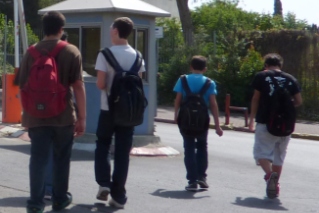 Photography: Emily Schneider
Photography: Emily SchneiderIn a High Court of Justice petition submitted on Thursday, October 2, a coalition of parents and community organizations have demanded that the Ministry of Education cancel its new tuition policy that enables public schools to collect exorbitant fees from parents of students. This policy would cause a clear separation in the public school system between those students whose parents can afford to pay thousands of additional shekels each year and those whose parents can not.
The petition was submitted by twelve parents from Ashdod and Ness Ziona, who pointed to the severe damage they suffered as a result of the establishment of special fee-based schools within the educational institutions where their children are enrolled. These parents were joined in their petition by Yedid – The Association for Community Empowerment, Hila – For Equality in Education, the Israel Association for Ethiopian Jews and the Association for Civil Rights in Israel – all of whom were represented by Attorney Haran Reichman from the University of Haifa’s Law and Education Policy Clinic.
The petitioners demanded that the Ministry of Education revoke its approval for educational institutions to charge additional fees to extend the school day – in some case almost doubling the classroom hours for participating students. Expensive extension courses and preparatory lessons were also offered for students in preparation for school exams. The petitioners are seeking the effective enforcement of the prohibitions on these educational policies and the abolition of the Education Ministry’s long term blueprint that would seemingly see the return a discarded system where schools illegally charge excessive fees.
The petitioners claim that under pressure from certain parents groups, the Ministry of Education has established privatization processes within the public education system. As a result, parents are required to pay annual fees reaching NIS 8,000. Those who are unable to pay are made to find alternative options. This policy would create two separate school systems within the public education system – one for the underprivileged, and the other for students who come from families with financial means and can pay for a higher quality of education at the cost of thousands of shekels each year.
Included in the petition are stories from the Shazar School in Ashdod that has been transformed into a special fee-based school and has rejected children from the neighborhood who can not afford its exorbitant fees. Children from the Hadar School in Ness Ziona have similarly been pushed aside following the establishment of the fee-based anthroposophy track.
Disturbing figures were presented in the petition illustrating how the additional fees collected from parents have been used in violation of ministry directives. For example, a principal in a Jerusalem high school receives “supplemental income” from the parents’ payments totalling NIS 35,000 per year, while the elementary school principal receives an extra NIS 24,000. In another Jerusalem based school, a public school for all intents and purposes, the principal receives, through the school association, an apparent salary boost of NIS 30,000 each month from the supplementary fees.
According to Ms. Sivan Ochivan, a mother of a student in Ashdod’s Shazar School: “The policies of the Ministry of Education and the municipality has transformed the local school where my children learn into a special institution that charges high tuition. We, the parents who live close to the school and can’t meet the high tuition, are labelled as “parasites” and suffer persecution by groups of parents wielding means and power. Most of the parents in the neighborhood have been forced to transfer their children to other, more distant schools, while the few who remain suffer condemnation and humiliation.”
According to Attorney Haran Reichman, representing the petitioners: “The policy of the director of the Ministry of Education, against which we have petitioned, gives a seal of approval, without any proper legal authorization, to the establishment of two parallel school systems: one to those with the means to pay, and the other for those without means. We are hopeful that the court will clarify to the ministry that it is the right of all Israeli children to realize their full potential, regardless of their parents’ financial capacity. During the last year, it was revealed that privatizing Israel’s public health system would cause enormous and widespread damage. I am afraid that private fee-based educational services within Israel’s public education system is no less dangerous to Israeli society. There is currently an inconceivable gap between public statements on the importance of equality and reducing disparities, and the practical policies that are entrenching socio-economic disparities and abandoning the disadvantaged segments of society and the residents of Israel’s periphery.”
Additional Materials







